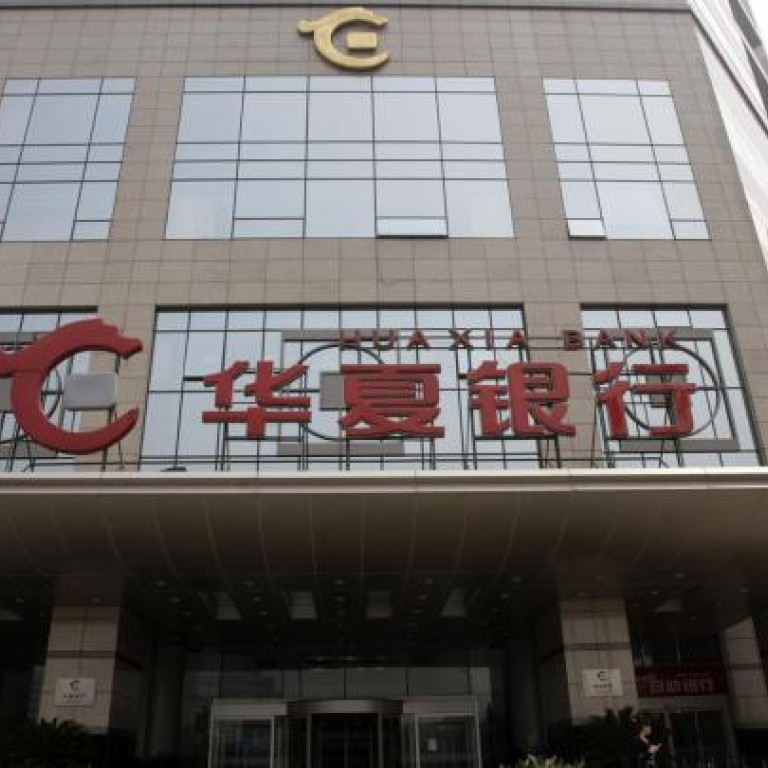
China's boom in wealth management products makes economists fear
A boom in small lenders selling unpredictable wealth management products has left economists fearing instability in the sector
The mainland's smaller banks boosted sales of wealth management products (WMPs) to account for more than 85 per cent of the 3.5 trillion yuan (HK$4.34 trillion) of offerings in the first nine months of this year, raising credit risks and deposit costs, Fitch Ratings said.

The yield on 2019 bonds sold by Evergrowing Bank, which Fitch said had the most outstanding products of any non-rated bank, has risen 29 basis points this half to 7.38 per cent, according to ChinaBond data.
Globally, finance companies pay an average 2.62 per cent, according to Bank of America Merrill Lynch indices.
Funding costs are rising as banks, whose WMPs offer higher returns than benchmark deposit rates, try to dissuade households from moving their savings elsewhere. The sales are transforming the stable and cheap deposit base that has supported lenders into one that is "more mobile, expensive and short-term", creating repayment risks for smaller banks, Fitch said.
"Some of those projects are quite risky," said Christine Kuo, senior credit officer in the financial institutions group of Moody's Investors Service in Hong Kong. "Banks will have contingent liabilities that could evolve a much bigger cost."
The wealth management vehicles typically offer higher yields than deposits and can include investments in bonds, the money market, discounted bills, trust loans and equity in property projects. The weighted average yield of the products last quarter was about 4 per cent, Fitch said. That compares with 3 per cent on one-year deposits.
The China Banking Regulatory Commission warned lenders about the risks of offering the high-yield investments last year and banned them from selling ones with maturities of less than one month. The regulator also prohibited banks from paying investors the expected rate of return by using profits earned from other business segments.
Lenders have said they can manage the risks associated with the products. Zhu Li, an official in the retail department of Evergrowing Bank in Shanghai, said most of the Shandong-based lender's wealth management products were low- and medium-risk products that were invested in bonds and bills. Excluding exceptional circumstances, they would be able to pay investors on time, she said.
The products, which are sold with few details about the assets backing them, are raising concerns that banks will face losses, according to Fitch.
Beijing-based Huaxia Bank would negotiate possible repayment with investors who lost money on the default of a savings vehicle that a former employee was suspected of promoting, the lender said last week.
The product being investigated at Huaxia Bank raised a total of 160 million yuan, according to China International Capital Corp, one of the nation's oldest investment banks. Huaxia Bank will take its share of responsibility after police and regulators complete an investigation, a spokesman for the lender's Shanghai branch said, declining to be identified, citing company policy. The bank is also trying to retrieve the remaining assets of the investment product.
Risks to China's financial system might be exacerbated if authorities curbed the growth of the products or raised interest rates, Xu Xiaoqing, head of fixed-income research at CICC, said.
The People's Bank of China might tighten monetary policy in 2014 if the economy recovered next year - just as most of China's corporate debt matured, Xu said. This would pressure issuers to sell short-term products and refinance their debt, Xu said.
China's factory output and retail sales topped forecasts last month, signalling that economic recovery is accelerating. Inflation rebounded from a 33-month low, with the consumer price index rising 2 per cent from a year earlier last month, the National Bureau of Statistics found.
The cost of insuring China's debt against non-payment has fallen this quarter. Credit-default swaps for five years dropped 30 basis points this quarter to 59 basis points as of Tuesday, according to data provider CMA.
The yuan closed at 6.246 per dollar yesterday, the China Foreign Exchange Trade System reported. Wealth management products made up about 10 per cent of the nation's banking system deposits, Barclays said.
